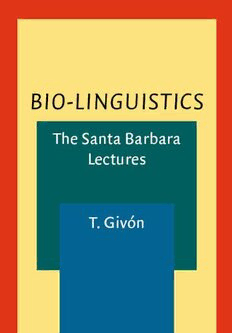
Bio-linguistics: The Santa Barbara Lectures PDF
402 Pages·1999·1.758 MB·English
Most books are stored in the elastic cloud where traffic is expensive. For this reason, we have a limit on daily download.
Preview Bio-linguistics: The Santa Barbara Lectures
Description:
Is human language an evolutionary adaptation? Is linguistics a natural science? These questions have bedeviled philosophers, philologists and linguists from Plato through Chomsky. Givon suggests that the answers fall naturally within an integrated study of living organisms. In this work, Givon points out that language operates between aspects of both complex biological design and adaptive behaviour. As in biology, the whole is an adaptive compromise to competing demands. Variation is the indispensable tool of learning, change and adaptation. The contrast between innateness and input-driven emergence is an interaction between genetically-coded and behaviourally-coded experience. In enlarging the cross-disciplinary domain, the book examines the parallels between language evolution and language diachrony. Sociality, cooperation and communication are shown to be rooted in a common evolutionary source, the kin-based hunting-and-gathering society of intimates. The book pays homage to the late Joseph Greenberg and his visionary integration of functional motivation, typological diversity and diachronic change.
See more
The list of books you might like
Most books are stored in the elastic cloud where traffic is expensive. For this reason, we have a limit on daily download.
